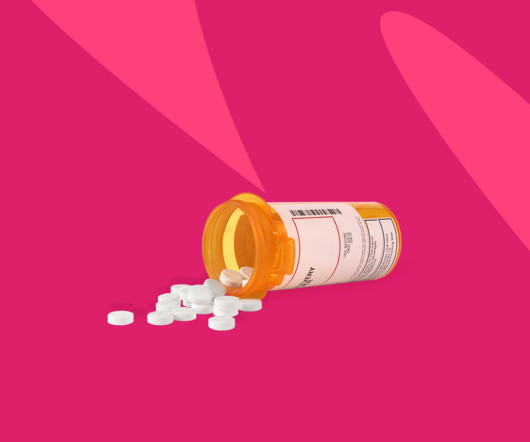An Informatics Approach to Preventing Diversion of Controlled Substances
Pharmacy Times
JUNE 3, 2024
Data analysis can help hospitals address waste of controlled substances that fuels diversion and increased costs.
This site uses cookies to improve your experience. To help us insure we adhere to various privacy regulations, please select your country/region of residence. If you do not select a country, we will assume you are from the United States. Select your Cookie Settings or view our Privacy Policy and Terms of Use.
Cookies and similar technologies are used on this website for proper function of the website, for tracking performance analytics and for marketing purposes. We and some of our third-party providers may use cookie data for various purposes. Please review the cookie settings below and choose your preference.
Used for the proper function of the website
Used for monitoring website traffic and interactions
Cookies and similar technologies are used on this website for proper function of the website, for tracking performance analytics and for marketing purposes. We and some of our third-party providers may use cookie data for various purposes. Please review the cookie settings below and choose your preference.

Pharmacy Times
JUNE 3, 2024
Data analysis can help hospitals address waste of controlled substances that fuels diversion and increased costs.

Pharmacy Times
DECEMBER 21, 2022
A controlled substances diversion prevention program (CSDPP) that aligns with the revised ASHP guidelines is critical to ensure patients are protected from occurrences of drug diversion.
This site is protected by reCAPTCHA and the Google Privacy Policy and Terms of Service apply.

The FDA Law Blog
MAY 16, 2024
Houck — Employee diversion of controlled substances from hospitals has been an issue since at least 1986 when I became a diversion investigator with the Drug Enforcement Administration (“DEA”). DEA alleged that UMHS failed to maintain complete and accurate records and failed to timely notify DEA of controlled substance thefts.

The FDA Law Blog
FEBRUARY 11, 2025
Houck One of the most significant issues facing hospitals and other facilities is the diversion of controlled substances meant for patients by physicians, pharmacists, nurses and other trusted healthcare employees. Click here to learn more about the Opioid & Abuse Management Congress.

The Checkup by Singlecare
JANUARY 9, 2025
Many people mistake it for a controlled substance. However, medical experts say this is untrue, as the prescription medication is not classified as a controlled substance by the United States Drug Enforcement Administration (DEA). Is cyclobenzaprine a controlled substance? What is cyclobenzaprine?

Omnicell
SEPTEMBER 5, 2022
Gee Mathen, Director Pharmacy Clinical Applications & Technical Services, Texas Children Hospital When it comes to the crippling costs of diversion, the numbers don’t lie: 1 in 10 healthcare workers will abuse drugs, and studies show that the annual impact is upwards of $72.5

The FDA Law Blog
SEPTEMBER 12, 2023
More than 40 registrants — primarily hospitals and pharmacies — have paid significant civil penalties of up to $5,000,000 to settle allegations they failed to report controlled substance thefts or significant losses to the Drug Enforcement Administration (DEA). The risks to hospitals and pharmacies are multi-faceted and growing.

STAT
MAY 1, 2024
The DEA dictates the quantity of controlled substances that drug companies are allowed to make. Until this year, those quotas were set annually for Schedule II drugs, such as morphine and other injectable opioids that hospitals regularly use.

The FDA Law Blog
SEPTEMBER 26, 2023
More than 40 registrants — primarily hospitals and pharmacies — have paid significant civil penalties of up to $5,000,000 to settle allegations they failed to report controlled substance thefts or significant losses to the Drug Enforcement Administration (DEA). The risks to hospitals and pharmacies are multi-faceted and growing.

Omnicell
JANUARY 10, 2023
Tara Plappert Product Marketing Manager Hospitals and clinics face a significant challenge when dealing with controlled substances. More concerning, on average, it takes about 22 months for a hospital to discover an incident of diversion. And according to the 2019 Drug Diversion Digest , 47.2

The FDA Law Blog
JUNE 10, 2024
Houck — It seems as though we cannot get through a week without hearing about controlled substance diversion by employees at another hospital or healthcare facility. DEA, Palomar Hospital Pays $250,000 for Diverting Fentanyl ( June 3, 2024 ). By Larry K.

Omnicell
SEPTEMBER 5, 2022
billion is forecasted to be spent on electronic health records (EHR) by 2024, many hospitals continue to be burdened with costs. Hospitals spend $563 million in readmissions, $359 million in drug shortages, $800 million in expired medication, and $7.5 Disconnected systems also complicate merger and acquisition activity. Although $9.9

Omnicell
JANUARY 10, 2023
Kim Dove, PharmD Senior Pharmacy Consultant, Omnicell We all understand the harm that controlled substance drug diversion can cause to patients, the healthcare institution, and of course, to the diverters themselves. Consider your practices for entering new medication shipments into inventory.

OctariusRx
DECEMBER 12, 2022
Just a few years ago, the University of Michigan Hospital was fined $4.3 million dollars for violating provisions of the controlled substances act. Do you know what provisions of the controlled substances act apply to your facility? Who in your facility is expert in all aspects of managing controlled substances?

OctariusRx
FEBRUARY 6, 2023
The topic of properly handling controlled substances is always at the forefront of any discussion on compliance, but it extends far beyond just a paper trail. Not too many years ago, the University of Michigan Hospital was fined $4.3 million dollars for violating provisions of the controlled substances act.

Omnicell
JANUARY 12, 2023
That’s what an average US hospital loses due to nursing turnover, according to the 2022 NSI National Health Care Retention & RN Staffing Report. While nursing turnover has historically trended below the hospital average across all staff, in 2021 it actually increased 6.4 million annually.

Omnicell
SEPTEMBER 5, 2022
So, how can we make medication management easier for nurses so they’re not darting across hospital hallways searching for medications to retrieve? Complicating matters is that 80% of medication management is done outside of the pharmacy. One word: cloud.

Omnicell
JANUARY 10, 2023
Given the number of high-alert controlled substances administered under often intense conditions inside the operating room (OR), it's no surprise. The pharmacy must also make sure that all controlled substances distributed are properly recorded. In 95 percent of U.S.

Omnicell
JANUARY 10, 2023
In a recent survey , Hospital CEOs' top concern wasn't finances for the first time in almost a decade. However, a recent survey of hospital nurses discovered that manual activities were the primary source of irritation. This is not a new problem. However, pandemic burnout and other job pressures are increasing staff turnover.

The Checkup by Singlecare
JANUARY 2, 2025
Opioids are controlled substances prescribed by healthcare professionals to treat instances of severe, acute pain. Additionally, opioids are classified as controlled substances in the U.S. states have begun classifying gabapentin as a controlled substance. What are opioids? Still, some individual U.S.

Omnicell
JANUARY 10, 2023
Yet in operating rooms and procedure areas – where a large quantity of tightly regulated controlled substances are administered – similar technology is used by just over half of health systems. Ideally pharmacy and anesthesia providers should work in partnership to maintain controlled substance accountability.

The FDA Law Blog
JANUARY 18, 2024
Houck — In August 2023 the Food and Drug Administration (“FDA”) and Health and Human Services (“HHS”) recommended that the Drug Enforcement Administration (“DEA”) reschedule marijuana from schedule I under the federal Controlled Substances Act (“CSA”) to schedule III. HHS forwards FDA’s analysis and recommendation to DEA.

The Checkup by Singlecare
MAY 1, 2024
It is a Drug Enforcement Administration (DEA) controlled substance in the Schedule II category. Non-amphetamine-based ADHD treatments, such as Strattera , are not controlled substances. Food and Drug Administration (FDA) in 2007 for treatment and symptom control in ADHD. Vyvanse was initially approved by the U.S.

The Happy PharmD
JANUARY 4, 2023
But I have had hospital employees who came to the Pharmacy and asked for [free] antacid liquid or [free] acetaminophen tablets. especially since they worked in the hospital. A college student was a patient in our hospital. He had gotten ill while he was in school and was rushed to our hospital. I’m sorry,” I often said.

Omnicell
JANUARY 10, 2023
Joy Somogyi Senior Director, Product Marketing, Intelligence Solutions In the medical profession, one in ten healthcare workers will abuse controlled substances due to access and availability at work. Diversion in health systems isn't a question of "if," it's a matter of "when."

The Checkup by Singlecare
DECEMBER 30, 2024
The standard treatment involves emergency veterinary care, catheterization, medications, and brief hospitalization. Diazepam is a controlled substance and may not be safe for people if used inappropriately. In that case, call the veterinarian immediately or take the cat to a veterinary hospital.

Omnicell
JANUARY 10, 2023
hospitals haven't yet fully deployed automation in their operating room or procedural areas. Manual processes make it easier for drug diversion since there are fewer opportunities to detect missing controlled substances right away. It's where any number of medications are drawn up and administered, yet half of U.S.

Omnicell
SEPTEMBER 5, 2022
” This CE-accredited session for pharmacy and nursing discussed how COVID-19 is compounding complications of Substance Use Disorder, and shared best practices for diversion monitoring in order to refocus resources and revise schedules amidst COVID-19. .”

Omnicell
JANUARY 10, 2023
Sabrina Cole, PharmD, MBA Director, Autonomous Pharmacy Advisory Board, Omnicell Hospitals in approximately 40 states have reported critical labor shortages, while hospitals in all 50 states anticipate being short-staffed within a few weeks. Some hospitals are currently restricting services as a result of hospital labor scarcity.

SingleCare
NOVEMBER 17, 2021
For example, prescriptions for controlled substances like Adderall or Ritalin are not typically available through an online doctor. That’s because federal law requires providers to conduct at least one in-person visit before prescribing a controlled substance online. What are the benefits of using telemedicine?

Omnicell
SEPTEMBER 5, 2022
Studies show that 1 in 10 healthcare workers will experience substance abuse at some point during their lives. Historically, hospitals have relied upon cumbersome reports to stop diversion. Yet despite being the hardest hit by diversion, many health systems lack the necessary tools to detect these incidences in real-time.

The Checkup by Singlecare
JULY 10, 2024
Hydroxyzine can treat acute anxiety symptoms, similar to Xanax, Ativan, and Klonopin, but unlike those benzodiazepines, it is not a controlled substance. In older adults, these side effects can lead to serious complications like fractures or hospitalizations,” he continues.

Omnicell
JANUARY 10, 2023
At the same time, Pharmacy needs to maintain accountability for the controlled substances being dispensed. Anesthesia providers need to balance patient care with the administrative tasks that come with managing medication safety. Join me and my colleagues M.

Omnicell
JANUARY 10, 2023
I was first introduced to automated dispensing cabinets for removal of medications when I graduated from nursing school and began working at a hospital in South Carolina. I quickly learned how the automation cabinets provided security and safety for patient care.

The Checkup by Singlecare
OCTOBER 4, 2023
Minisha Sood, MD , a board-certified endocrinologist at Northwell Lenox Hill Hospital in New York City, doesn’t recommend Vyvanse for the sole purpose of weight loss, but she says weight loss is sometimes an unintentional side effect of the medication. “The

Omnicell
JANUARY 10, 2023
Luke's University Hospital in eastern Pennsylvania. For years, the hospital employed a cart fill model, supported by automated carousel and robot technology in the central pharmacy. Hospital patients received medications through delivery to server boxes outside their rooms.

Omnicell
SEPTEMBER 5, 2022
The OR accounts for almost 70% of hospital revenue, a critical business unit for healthcare recovery following COVID-19. The OR also accounts for almost 40% of hospital expenses, as many of the Anesthesia drugs are the highest priced medication on a per unit basis.

The Checkup by Singlecare
JULY 20, 2024
If a cat has a seizure, immediately contact the veterinarian or take the cat to a veterinary hospital. If a cat has been given too much tramadol or shows signs of an overdose, immediately call the veterinarian or take the cat to a veterinary medicine emergency hospital. Can I give my cat tramadol every day?

Omnicell
JANUARY 10, 2023
At TidalHealth, we're partnering with our nursing and anesthesia colleagues to drive diversion awareness and controlled substance monitoring. Our anesthesia department recently formed a new diversion-prevention team within the hospital.

Omnicell
SEPTEMBER 5, 2022
More than 50 industry experts from leading health systems, including Vanderbilt University Medical Center, Texas Children’s Hospital, Stanford, UCSF, TidalHealth, and Massachusetts General, led over 20 sessions exploring the most pressing issues in medication management – controlled substance management, IV safety and accuracy, 340B compliance, (..)

Omnicell
SEPTEMBER 5, 2022
We have more than 50 industry experts leading health systems, including from Vanderbilt University Medical Center, Texas Children’s Hospital, Stanford, UCSF, TidalHealth, and Massachusetts General, just to name a few, addressing topics from controlled substance management to IV compounding , and more.

The Checkup by Singlecare
MAY 24, 2024
In a veterinary clinic or animal hospital, veterinarians usually give intravenous injections of diazepam and other drugs called anticonvulsants like phenobarbital or levetiracetam. It is a federally controlled substance because of the risk of physical dependence, tolerance, withdrawal, abuse, and overdose.

The Checkup by Singlecare
MARCH 8, 2024
Still, it is a controlled substance and comes with the risk of drug abuse and physical dependence. Xanax is the brand name of the medication, but it is readily available as a generic formulation in an oral concentrate solution, tablets, orally disintegrating tablets, and extended-release tablets.

The FDA Law Blog
NOVEMBER 29, 2022
The recommendations do not apply to inpatient hospital care, in the emergency department or other observed settings. They do apply, however, to prescribing for pain management upon discharge. Clinicians should not use toxicology test results punitively nor dismiss patients based on toxicology test results.
Expert insights. Personalized for you.
We have resent the email to
Are you sure you want to cancel your subscriptions?


Let's personalize your content